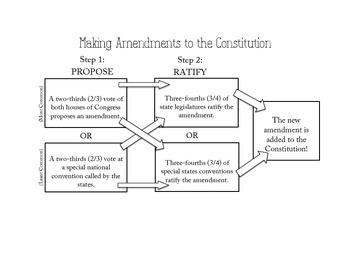Constitution Memorization
1/37
Earn XP
Name | Mastery | Learn | Test | Matching | Spaced |
|---|
No study sessions yet.
38 Terms
The Preamble
The founders wanted to form a more perfect union, establish Justice, insure domestic tranquility, provide for the common defense, promote the general welfare, and secure the blessings of liberty to ourselves and our posterity
Article 1
The Legislative Branch
establishes congress: senate and house of representatives
Article 1, Section 8
Lists the enumerated powers of congress:
Grants authority to legislate in areas such as taxation, commerce regulation, naturalization, creating federal courts, raising armies and navies, declaring war, establishing post offices, and protecting intellectual property
Article 2
Executive Branch - the President
Article 3
Judicial Branch - Supreme Court
Article 4
Federalism:
Full Faith and Credit Clause - Constitution’s requirement that each state accept the public acts, records, and judicial proceedings of every other state
Privileges and Immunities Clause - Protects the fundamental rights of individual citizens and restrains state effort to discriminate against out of state citizens
Article 5
Amendment Process

Article 6
The Constitution and any laws or treaties made are the law of the land which the judges and states are bound by (supremacy clause)
Executive and Legislative Checks and Balances
Executive can veto congressional legislation
Legislative can impeach president and pass laws over presidential veto
Executive and Judicial Checks and Balances
Executive: the president nominates supreme court judges
Judicial can declare presidential acts unconstitutional
Judicial and Legislative Checks and Balances
Judicial can declare laws unconstitutional
Legislative can impeach judges and senate confirms presidents judge nominations
1st Amendment
Congres can’t have a law about establishing religion, or prohibiting freedom of religion, press, speech, peaceful assembly, and petitioning the government
2nd Amendment
Right to bear arms
3rd Amendment
No soldier shall be quartered in any house
4th Amendment
Right to reasonable search and seizure
Warrants only under probable cause
5th Amendment
Right to remain silent, right to a trial, can’t have property taken for public use without just compensations, protects from double jeopardy
6th Amendment
Right to a public trial, right to a public defense
7th Amendment
Right to trial by jury
8th Amendment
No excessive bail or fines and no cruel or unusual punishment
9th Amendment
The rights of citizens are protected whether they’re listed or not
10th Amendment
Powers not delegated to the US are reserved for the state and the people
11th Amendment
States can’t be sued in federal court by citizens of other states or foreigners
12th Amendment
Requires voters to cast separate ballots for president and vice president
13th Amendment
Abolishes slavery and involuntary servitude
14th Amendment
Grants US citizenship to all people born in the US; no state can deny anyone the right to life, liberty, or property without due process of law
15th Amendment
Government can’t stop someone from voting based on race or color
16th Amendment
Congress can levy and collect federal income taxes from people and businesses
17th Amendment
Gives the right to the people to elect senators
18th Amendment
No manufacture, sale, or transportation of alcoholic beverages
19th Amendment
Women have the right to vote
20th Amendment
Congress takes office January 3rd, President and Vice President take office January 20th
21st Amendment
Ends ban on alcohol
22nd Amendment
2 term limit for presidents
23rd Amendment
Gave Washington D.C. electoral votes
24th Amendment
Prohibits poll tax
25th Amendment
Says vice president becomes president if the president is unable to serve
26th Amendment
Right to vote cannot be denied to any citizen 18+
27th Amendment
Congress change in salaries can’t take effect until after the election of the next representatives